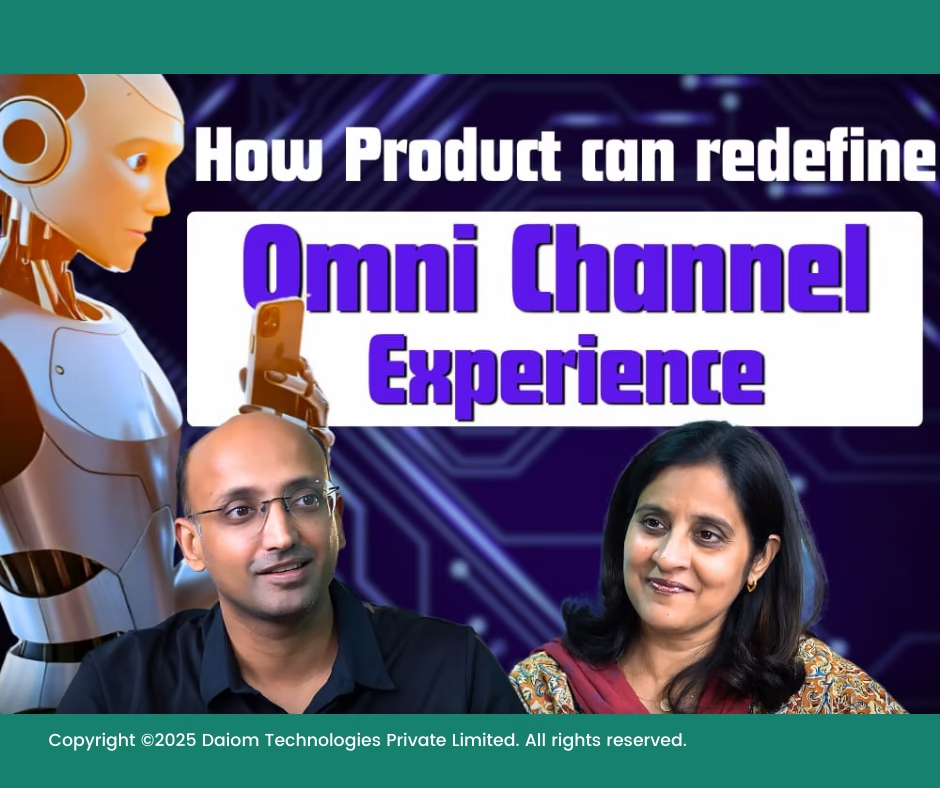In the latest episode of Product Talk with Malthi, Saurabh Agarwal, the Founder & CEO of DAiOM, joined host Malthi SS for a thought-provoking discussion on the evolving landscape of AI, product analytics, and growth marketing.
Malthi SS, the host of Product Talk with Malthi, is the Founder & CEO of SparkProd, a platform focused on women’s career engagement. A seasoned global product leader, startup mentor, and product coach, she has built products for millions of customers at PayPal, SAP, Intuit, and more.
Recognized as one of India’s Top 100 AI Leaders, Saurabh brings deep expertise in AI-driven business growth. With a career spanning leadership roles in data, analytics, and omnichannel strategy, he has helped businesses scale through intelligent decision-making.
With vast experience across India’s leading enterprises and startups, Saurabh has been instrumental in bridging data-driven insights with business impact.
In the conversation, Saurabh explored how AI is reshaping product management, questioning whether we are moving toward AI-first products.
He discussed the growing role of product analytics, examining whether it remains a skill or has evolved into a full-fledged career path.
Read more – Product Analytics: The Key to Growth and Retention
Read on to deep dive into the key insights from the podcast.
How AI and Data Analytics are Reshaping Product Functions?
One of the key points discussed in the podcast was how AI and analytics are changing the way product managers approach decision-making.
Saurabh explained that companies are increasingly using machine learning models to predict customer preferences, personalize user experiences, and optimize pricing strategies.
In industries like healthcare, AI is playing a critical role in diagnosing diseases, improving patient care, and even predicting medical outcomes based on patient history.
Product managers in these domains must not only understand the technical aspects of AI but also ensure that ethical considerations and user trust remain a top priority.
Saurabh emphasized that while top-tier product managers often possess analytical skills, their main challenge lies in prioritization.
With the vast amount of data available, knowing what to measure and how to act upon insights is crucial. The best product managers are those who can combine analytical thinking with strong decision-making and business acumen.
The Need for AI Literacy in Product Management
As AI continues to enter various industries, the CEO of DAiOM highlights that AI literacy is becoming a non-negotiable skill for product managers. Even if they are not expected to build AI models themselves, they must have a strong understanding of how AI works, how models are trained, and the potential biases that can arise in AI-driven decisions.
Saurabh pointed out that some of the most successful product teams today are those that effectively integrate AI into their workflows.
Whether it’s recommendation engines in e-commerce, fraud detection in fintech, or chatbots in customer service, AI-driven features are becoming an expectation rather than an added advantage.
The Evolution of Personal Branding in a Data-Driven World
Beyond analytics and AI, Malthi and Saurabh also discussed the importance of personal branding, especially for product leaders.
In a world where professionals are increasingly recognized for their thought leadership, having a strong personal brand can open new doors and create opportunities for collaboration.
Saurabh highlighted how LinkedIn and other platforms have enabled product managers to share their insights, case studies, and learnings, making them more visible in their industry.
He emphasized that those who regularly engage with the community and provide valuable content can establish themselves as authorities in their field.
Omnichannel Growth: The Future of Customer Experience
Another major theme of the discussion was the role of omnichannel strategies in scaling businesses.
Saurabh explained that consumers today expect a seamless experience across multiple touchpoints—whether it’s a website, mobile app, physical store, or customer service channel. Companies that fail to create a unified customer experience risk losing engagement and loyalty.
At DAiOM, Saurabh and his team are helping businesses leverage data to drive omnichannel growth. He shared examples of how brands can use customer insights to create personalized interactions, improve retention, and maximize conversions.
The key, he noted, is to break down silos between different departments (marketing, sales, product, and customer service) and ensure that data is used cohesively to enhance the customer journey.
Key Areas To Focus On: Insights from the Conversation
Building on the discussion around AI, product analytics, and omnichannel growth, Malthi and Saurabh explored how businesses can move beyond just data collection to truly actionable insights. Here are some of the key takeaways:
- Customer Data Integration: Brands often struggle with fragmented customer data across multiple platforms. By unifying offline and online data, businesses can ensure seamless tracking, personalization, and better decision-making.
- Marketing Analytics & Attribution: One of the biggest challenges in marketing today is understanding which efforts drive actual conversions. Effective attribution models help optimize marketing budgets and maximize return on investment.
- Product & Behavioral Analytics: Knowing how users interact with a product is crucial for improving engagement and retention. Identifying high-impact features can directly influence monetization strategies and product roadmaps.
- AI & Data-Driven Campaign Execution: AI enables precision marketing by leveraging machine learning models for customer segmentation, automated targeting, and personalized messaging. This approach helps brands scale efficiently without guesswork.
Curious to dive deeper into these insights?
Watch the full conversation between Malthi and Saurabh, where they discuss AI, product analytics, and growth strategies in detail.
Final Thoughts: The Future of Product Management
As the conversation wrapped up, Saurabh shared his thoughts on where product management is headed. He believes that the future will be defined by a greater emphasis on data literacy, AI-driven insights, and customer-centric design.
Product managers who can adapt to these changes and continuously upskill themselves will have a significant edge over the competition.


